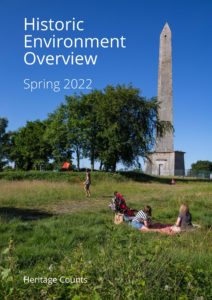
Throughout the financial year 2021-22 the pandemic continued to have a significant impact on historic environment sector, despite the successful rollout of the vaccination programme which led to the lifting of most restrictions and the continuation of emergency funding. Notwithstanding the pandemic, we have seen some major policy changes (e.g. the funding streams replacing EU funding, the development of the levelling up agenda, etc.) which may transform the way the historic environment is managed. These update are captured in the new report ‘Historic Environment Overview (Spring 2022)‘, which is part of the ‘Heritage Counts’ products.
The Historic Environment Overview also shows the ingenuity of the sector, which responded to the challenges in innovative ways (e.g. developing digital activities, initiating programmes to strengthen resilience), harnessing opportunities such as the COP26 event held in Glasgow.
The Historic Environment Overview (Spring 2022) has been produced by the Historic Environment Forum with support from the National Trust and Historic England.
The report focuses on 5 key sections:
- Updates from DCMS and ALBs. 2021-22 has been a challenging year for all with a continued focus on response and recovery from Covid-19. Following the ending of remaining restrictions in spring 2022, there have been many achievements over the last year that have highlighted the importance of the heritage sector to wider recovery, and the value of the investment in the Culture Recovery Fund.
- The Funding and Resource Landscape. In the financial year 2021-22, funders continued to expend considerable efforts supporting existing heritage projects to survive the Covid-19 crisis, and to start building future resilience. New opportunities emerged (e.g. levelling up funding).
- Heritage Policy and Management.
- Different organisations worked to support the sector and increase its resilience. Among other things, this work resulted in the development of the forthcoming Heritage Sector Resilience Plan.
- The sector concentrated on increasing its sustainability and on contributing to addressing climate change, protecting heritage and its value for local communities. ‘Heritage Responds’, the report developed by the Historic Environment Forum, includes case studies which show how the sector is taking positive action against climate change.
- Equality, Diversity and Inclusion continue to be priorities in the sector, with key organisations taking action to make the sector more diverse and inclusive.
- Historic England is continuing to work to fight Heritage Crime.
- Whilst the de-listing of Liverpool from the World Heritage List has been a blow for the UK’s otherwise considerable record of good practice over 35 years, 2021 also saw some successes, such as the inscription of 2 other sites.
- In 2021-22 we saw some changes to legislation, including wedding legislation, and proposals to change the Treasure Act.
- News relating to the Planning System. This section includes also updates on development-led archaeology, local authority capacity, and important infrastructures such as HS2.
- Participation and Capacity Building.
- Whilst Covid-19 threatened the sector’s, it also encouraged new ways of working, harnessing the potential of digital interaction or hybrid activities. The CBA Festival of Archaeology and Heritage Open Days are just 2 examples of this.
- Heritage Skills. 2021 saw three major schemes commence, led by Historic England, but aiming to strengthen the resilience of the sector. Other organisations are contributing to build skills through apprenticeships (e.g. CIfA and National Trust) and dedicated projects (Rebuilding Heritage).
- A section of the report focuses on the state of higher education in heritage, and on partnership between universities and key organisations in the sector.
- It is generally accepted that arts, culture, heritage and nature have the potential for multiple impacts on our wellbeing. Historic England has worked to clearly demonstrate the wellbeing outcomes of engaging with the historic environment.
- The report concludes with an overview of the heritage awards, supported by Historic Houses, the CBA and Ecclesiastical (Heritage Heroes).

